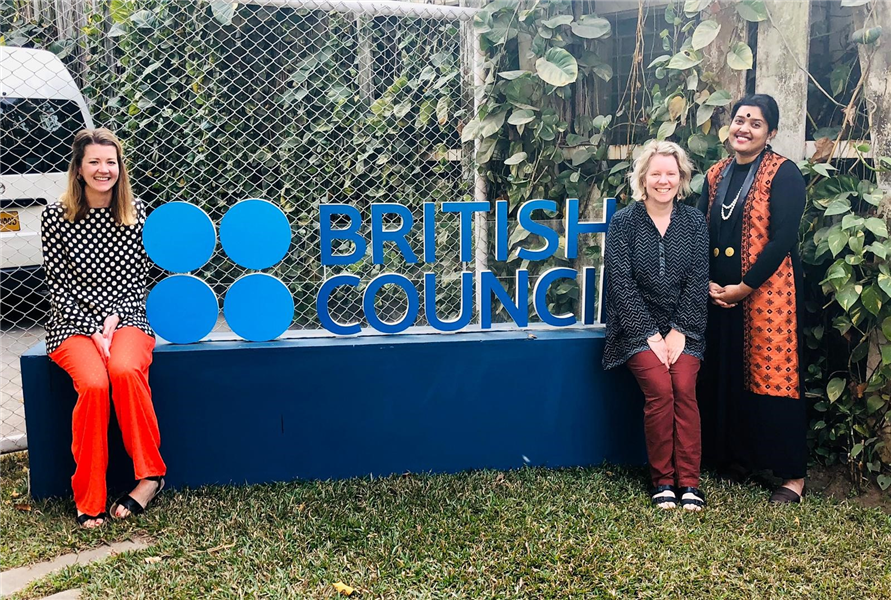- Home
- News
- MAC visits ambitious contemporary artists in Dhaka
MAC visits ambitious contemporary artists in Dhaka
21 April 2020

Deborah Kermode, Chief Executive and Artistic Director of Midlands Arts Centre (MAC) and curator Alice Swatton visited Bangladesh between 12-18 February as one of seven cultural exchanges funded by Transforming Narratives’ open call for artistic projects.
The main aim of their visit was to meet Epiphania Visuals, a group of artists based in the Bangladeshi capital Dhaka, to plan a forthcoming exhibition at MAC. Whilst there they also spent time with The Bengal Foundation, a trust for arts in the city, the British Council and the Dhaka Art Summit, exploring the cultural scene and possible future collaborations with artists.
Deborah said she was keen to work with Epiphania Visuals following their visit to Birmingham last year, as part of a research and development trip in conjunction with Transforming Narratives.
Artists Dipa Mahbuba Yasmin and Akramul Momen spent time in Birmingham in March 2019, to seek collaborations with artists and organisations working on themes of religious fundamentalism, social and political crisis, marginal sexuality and gender discrimination.
“I first met curator and artist Dipa when she visited Birmingham as part of the Transforming Narratives research trip,” said Deborah. “Her approach to contemporary art struck me as being ambitious, offering a fresh perspective on life in Bangladesh that I had never seen before. At MAC, we’re interested in supporting young curators to find their voice and share new cultural experiences that speak honestly to audiences. Dipa’s passion for developing the work and opinions of her artistic colleagues in Dhaka felt very relevant to me.”
Established in 1962, MAC is situated in one of Birmingham’s largest public parks, surrounded by a large South Asian community, and has been presenting international work across art forms for many years, particularly cinema. However, since Deborah’s appointment as Chief Executive in 2016, there is a strategic plan to commission more international artists.
“As Birmingham in itself is an ambitious global city, I believe it’s important to present a range of lived experiences, particularly from the Caribbean and South Asia,” she said. “Audiences are attracted to seeing their own heritage in whatever form reflected in the programme and it’s very exciting to work with new perspectives.”
The aim of the recent exchange trip was to visit the artists and discuss how the future exhibition was developing with Deborah and Alice spending time at their small studio and gallery space in Dhaka.
“Transforming Narratives is super important to MAC. It’s been fully embedded into our Artistic and Strategic Plans,” says Deborah. “Colleagues, trustees and stakeholders understand the opportunities it has offered to the organisation and we are extremely grateful to the British Council and Arts Council England for their steadfast commitment and investment to this very dynamic programme.”
With MAC being situated in a largely South Asian neighbourhood, Deborah says she has always been keen to ensure that the arts centre presents a range of high-quality work that ‘either originates from Pakistan, Bangladesh and of course India, and to support artists connected to those heritages to showcase their work with us’.
“Transforming Narratives has opened up some excellent networks which we will continue to develop into the future,” she says. “For example, we are talking to a Bangladeshi artist about a new commission for the Commonwealth Games, through our research visit to the Dhaka Art Summit. I must emphasise this is a huge commitment to the organisation now, and we look forward to sharing our learning with audiences and cultural colleagues across Birmingham and beyond for many years to come.”
This was also Alice’s first international trip as part of a cultural organisation and she said it was really important to visit Bangladesh, experience the culture and to meet with the artists in person as it gave more meaning to the exhibition before it came to the point of long-distant exchanges and the work being displayed.
“It made sense to meet with the group, see a selection of their work and discuss their proposals,” she says.
“We also met curators at The Bengal Foundation and had a tour of their exhibition and social spaces to get a feel for what’s happening in Bangladesh - they have a library, café and community space where people can read, borrow and have conversations.”
She says the next steps are to set out a timeline for the exhibition and develop the programme around it, which includes partnering with Birmingham’s SHOUT Festival.
“MAC will also link the exhibition to film screenings, social events and it will be an opportunity for Deborah to mentor Dipa and myself,” she says. “The exhibition will feature paintings, video art, possibly direct painting onto walls and animation. And it will be a great opportunity for Epiphania Visuals’ work to be seen by a wider audience.”
The exhibition will take place in 2021 at MAC.
← Read other news articles